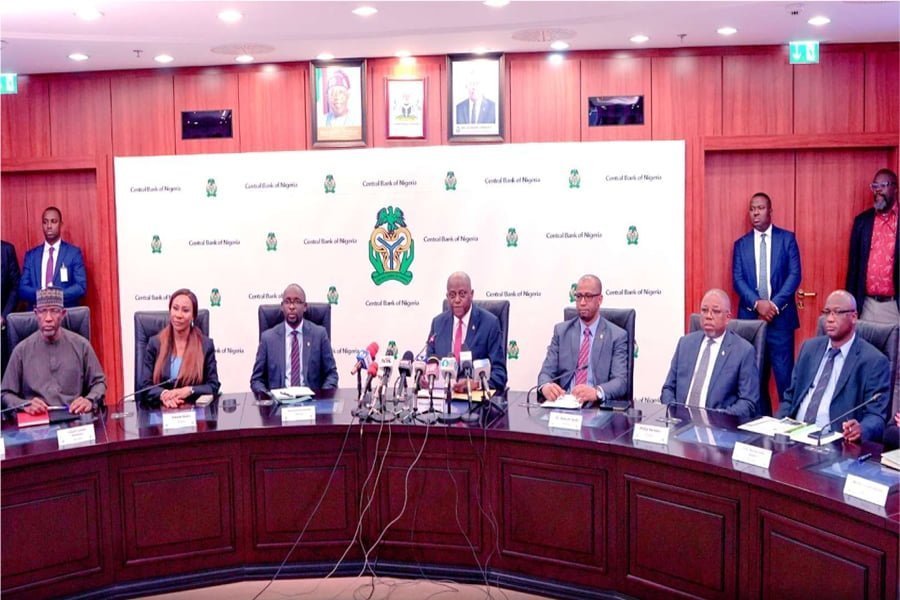Date: Tuesday, 26 March 2024
Ref: CBN/MPC/COM/151/294
MONETARY POLICY RATE ADJUSTED BY
200 BASIS POINTS TO 24.75 PER CENT
The Monetary Policy Committee (MPC) of the Central Bank of Nigeria (CBN)
held its 294th meeting on the 25th and 26th of March 2024 to review recent
economic and financial developments as well as assess risks to the outlook.
Decisions of the MPC
The Committee’s decisions are as follows:
- Raise the MPR by 200 basis points to 24.75 per cent from 22.75 per cent.
- Adjust the asymmetric corridor around the MPR to +100/-300 basis points
- Retain the Cash Reserve Ratio of Deposit Money Banks at 45.0 per cent.
- Adjust the Cash Reserve Ratio of Merchant Banks from 10.0 per cent to 14.0
per cent - Retain the Liquidity Ratio at 30.0 per cent
Considerations
The considerations of the Committee at this meeting focused on the current inflationary pressures and the need to anchor inflation expectations as well as ensure sustained exchange rate stability. These considerations underscore the importance of the CBN’s commitment to the price stability mandate and the need to urgently bring inflation under control to ensure that purchasing power of ordinary Nigerians is restored in the short to medium term.
Members noted the continued rise in headline inflation, driven largely by food prices because of supply shortages and high cost of logistics and distribution.
The Committee, therefore, was of the view that addressing food insecurity is key to containing current inflationary pressures. On this note, Members commended the ongoing efforts of the Federal Government towards
addressing food insecurity, some of these measures include the provision of various palliatives, release of grains from the strategic reserves, distribution of seeds and fertilisers, as well as farm implements for dry season farming.
The Committee therefore called for the full implementation of the Federal Government’s agricultural policies and programmes to improve food supply and further advised for broader fiscal consolidation particularly on the
improvements of tax collection and tax-to-GDP ratio.
The Committee noted with satisfaction the level of stability achieved in the foreign exchange market in the last few weeks. This, in the view of Members reflects the impact of the Bank’s recent policy actions and reforms, as well as
increased transparency in the market. In addition, the Committee noted the efforts of the Bank in offsetting verified foreign currency obligations, an action that will greatly enhance investor confidence and attract foreign investments to Nigeria.
The MPC also reviewed developments in the banking system and noted that the industry remains safe, sound, and stable. The Committee thus, called on the Bank to sustain its surveillance and ensure compliance of banks with
existing regulatory and macroprudential guidelines. The MPC also enjoined the Bank to expedite action on the recapitalisation of banks to strengthen the system against potential risks in an increasingly globalized world.
Consequently, at this meeting, the MPC was faced with the option of either progressing with its tightening cycle or hold, to observe the impact of the previous rate hike and adjustment of the Cash Reserve Requirement. After veviewing the balance of risks and the near-term inflation outlook, Members were convinced of the need to progress with the tightening cycle.
Key Developments in the Domestic and Global Economies
Domestic headline inflation rose further to 31.70 per cent in February 2024 from 29.90 per cent in January. Food inflation accelerated to 37.92 per cent from 35.41 per cent, while core inflation rose to 25.13 per cent from 23.59 per
cent. Key drivers of inflationary pressure remain the strong exchange rate pass-through to domestic prices; rising cost of transportation; high cost of energy and other production inputs; lingering insecurity, especially in foodproducing areas; and legacy infrastructure deficits.
Data from the National Bureau of Statistics showed that real GDP grew by 3.46 per cent in the fourth quarter of 2023, compared with 2.54 per cent in the previous quarter. Staff forecasts for 2024 indicate that the Nigerian economy will grow by 3.38 per cent.
Disruptions to the global supply chain, associated with pockets of geopolitical tensions continue to pose a key concern to monetary policy. Global inflation has however, continued to decelerate in 2024 but is expected to remain above the long-run objectives of major central banks. Interest rates of advanced economy central banks are thus expected to remain high in the short to medium term before commencing a descent. Consequently, global financial conditions may remain tight through 2024.
Accordingly, the Committee will continue to monitor developments in the global and domestic economies to ensure that inflationary expectations are anchored to restore and sustain macroeconomic stability.
All twelve members attended the meeting. The next MPC meeting will be held on the 20th and 21st of May 2024.
Thank you.
Olayemi Cardoso
Governor,
Central Bank of Nigeria
26th March 2024

